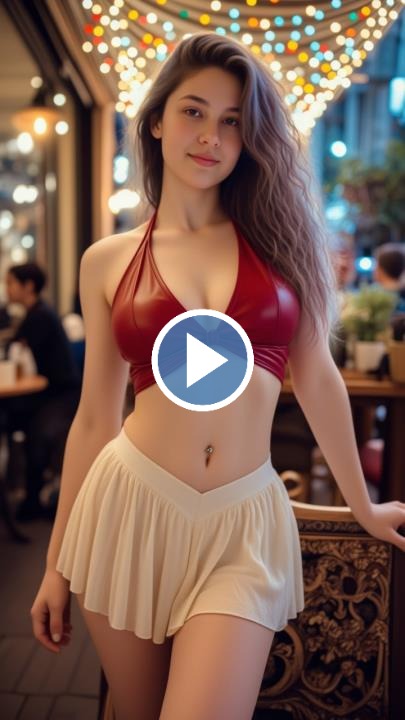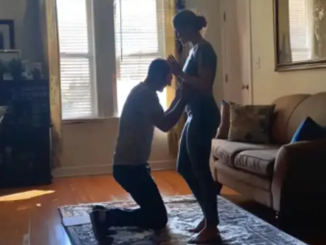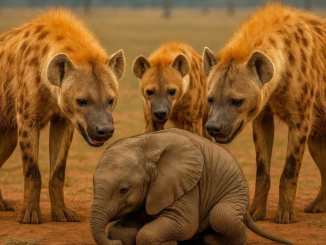
I was in line behind them—just grabbing some diapers and a frozen pizza, nothing major. The little girl was bouncing on her toes in that too-big coat, pointing excitedly at some Hello Kitty cereal on the conveyor belt.
Her grandma? She looked… tired. Worn down in a way that had nothing to do with the cold.
The cashier, a young guy with a calm, patient voice, started scanning. Everything was normal until he gave the total.
That’s when she froze.
She reached into her bag, pulled out a wallet, and started flipping through bills and coins—slow, deliberate, counting silently. I could tell before she said a word: it wasn’t enough.
“I think I’ll have to put some of that back,” she murmured, eyes darting to the girl, who suddenly went quiet.
The cashier glanced down at the cereal box, then at the container of oil, then the frozen chicken.
And then he did something that made everyone stop.
He pulled out his own wallet.
Didn’t make a show of it. Didn’t ask for a manager. Just slid his card through the machine and said, “It’s taken care of.”
The grandma blinked. “I—I didn’t mean for—”
He shook his head. “It’s okay. I got you.”
The little girl looked up at him like he was Santa Claus, clutching that cereal box like it was the best gift she’d ever gotten.
But right as I was about to thank him myself—maybe even offer to pay him back—the lady behind me raised her voice and said: “We can all give a hand to cover that”
The moment shifted.
Suddenly, people who had been quietly scrolling on their phones or fidgeting in line were pulling out their wallets. One guy tossed a five on the counter, another woman handed over a ten and said, “For next time.” A teen behind me asked if they could Venmo the cashier.
The cashier looked a little overwhelmed, but he smiled. “Thank you,” he said, softly. “That’s really kind.”
The grandma stood still, eyes wet now. She reached out and gently pushed the money back toward the cashier. “Please,” she whispered. “Let someone else need it more.”
The cashier gave her a kind look. “Ma’am, I’ve got family. I know how it is. Let people be kind to you.”
She paused like she wanted to argue, but then something inside her softened. She nodded, quietly. “Thank you,” she said, brushing a hand over the girl’s hair.
They left a moment later, cereal and all, the little girl waving to everyone like we’d just clapped for her in a school play.
And that would’ve been enough, honestly.
But that wasn’t the end.
I went to pay for my things next, and as the cashier scanned my pizza, I asked him quietly, “Do you know her? The woman?”
He shook his head. “Never seen her before. Just… didn’t feel right, watching them walk out with less than they needed.”
I nodded, feeling something stir in my chest. “Well, you did a good thing.”
He smiled, but it was a tired kind of smile. “We all try.”
As I left, I noticed a small sign on the wall near the exit. I must’ve passed it a hundred times before but never stopped to read it. It said, “Pay It Forward—Give What You Can, Take What You Need.”
There was a little shelf underneath it, stacked with canned goods, pasta, and a few bags of rice. A small cardboard box had toiletries in it—soap, tampons, toothpaste. It wasn’t a lot, but it was something.
And next to it? A small jar with a handwritten label: “Community Fund.”
That’s when I got it.
The cashier hadn’t just acted on impulse.
He was part of something.
Something small, maybe, but real.
That moment stuck with me for days. It got under my skin in the best way. I kept thinking about how we all just… followed that cashier’s lead. No speeches. No guilt trips. Just kindness, like it was the most natural thing in the world.
A week later, I went back to that store. I didn’t really need anything, but I grabbed a few things anyway. Some cereal, a couple of cans of soup. I dropped off some stuff at the little shelf by the exit. Nothing big. Just what I could spare.
That’s when I saw her again—the grandma.
She was standing near the milk section, the little girl still wearing that oversized coat, but this time with a pink scarf around her neck and a hot cocoa in her hand.
They looked… lighter. The kind of lighter that doesn’t come from money, but from relief. From knowing you’re not alone.
I almost didn’t go up to her, but something told me to.
“Hi,” I said, keeping my voice gentle. “We were in line together last week.”
She turned, and recognition lit her face. “Oh! Yes, I remember. That was… something, wasn’t it?”
I nodded. “It really was.”
She hesitated for a second, then said, “I’ve been thinking about that day a lot.”
“Me too.”
“I didn’t want anyone to feel sorry for me,” she said, looking down at her hands. “I used to be the one who gave. I volunteered, I donated to school drives, I baked cookies for neighbors. And then my daughter got sick, and suddenly I was taking care of a five-year-old with no income and a mountain of medical bills.”
I didn’t know what to say, so I just listened.
“I felt ashamed,” she said. “But that day… the way everyone just helped, no questions asked? It reminded me that people are still good.”
“They are,” I said. “And you don’t have to earn kindness.”
She smiled at that. “I’m trying to believe that.”
As we parted ways, I saw her drop a box of pasta into the community shelf.
A full circle moment.
And that could’ve been the end of it again—but it wasn’t.
About two months later, I was scrolling online when a post caught my eye. It was a local community board, and the headline read, “Anonymous Angel At Pine Hill Market Inspires Pay-It-Forward Movement.”
I clicked.
The article talked about how the small grocery store had seen a sudden uptick in community donations. Dozens of locals had stopped by with food, toiletries, even small envelopes of cash. Someone had donated new coats for kids. A high school art class painted a mural above the community shelf, and the little jar labeled “Community Fund” had to be replaced with a locked box because it was getting too full.
The spark?
A cashier paying for a stranger’s groceries.
There was even a blurry picture—taken from behind—of the moment it happened. The grandma, the little girl holding the cereal, and the cashier with his hand on the card reader.
I smiled. Then I messaged the article to a few friends and wrote, This is the kind of world I want to live in.
That night, I got a message from someone unexpected.
The cashier.
His name was Marcel.
“Hey,” he wrote. “I think we met a couple months back. Thanks for being kind.”
We chatted for a bit. He told me the store had started a small program where regulars could round up their total and the extra cents would go into the community fund. It had helped three families already.
He didn’t say it like he was bragging. Just stating facts.
But then he added something that stuck with me.
“You never know who needs help,” he said. “And you never know who used to help, but just needs a turn being helped.”
That sentence stayed with me.
A few weeks later, I decided to do something I’d never done before. I talked to my manager about setting up a similar “give shelf” in the lobby of our office. Just a bin for essentials—snacks, toothpaste, basic clothes. Nothing fancy. Just a way to look out for each other.
At first, I thought people would ignore it.
But they didn’t.
It grew.
First, someone left socks. Then a little sign-up sheet appeared for rideshares and babysitting swaps. Someone else started dropping off fresh fruit every Monday. It became a quiet but steady pulse of generosity.
I guess that’s the thing.
Big gestures are amazing—but it’s the ripple that matters.
That moment in the store? It rippled.
And maybe it started with a cashier and a little girl holding cereal.
But it kept going because people said yes to kindness.
Said yes to looking, really looking, at the people around them and asking, “What can I do?”
Not everything in life has a clean, rewarding ending. But this did.
Because the grandma? Her daughter recovered. She started part-time work again, and they moved into a small apartment near the school.
The little girl? She brought that cereal box in for show and tell, and when the teacher asked why it was special, she said, “Because a nice man bought it for us when we were really cold and hungry.”
And Marcel? He got promoted. Not because of that moment, but because he kept showing up for people. Day after day. Quietly. Steadily.
And me?
I realized that kindness is contagious if you let it be.
So here’s what I learned, and maybe it’s something you need to hear too:
You don’t have to fix everything.
You don’t have to be a hero.
But if you can see someone hurting—and you can help, even a little—don’t wait for permission.
Just do it.
The world doesn’t change all at once.
It changes in line at a grocery store, when someone says, “I got you.”
If this story moved you even a little, share it. Like it. Pass it on.
Because someone out there might be waiting for a sign that it’s okay to be kind again.
And maybe… this is it.






Leave a Reply